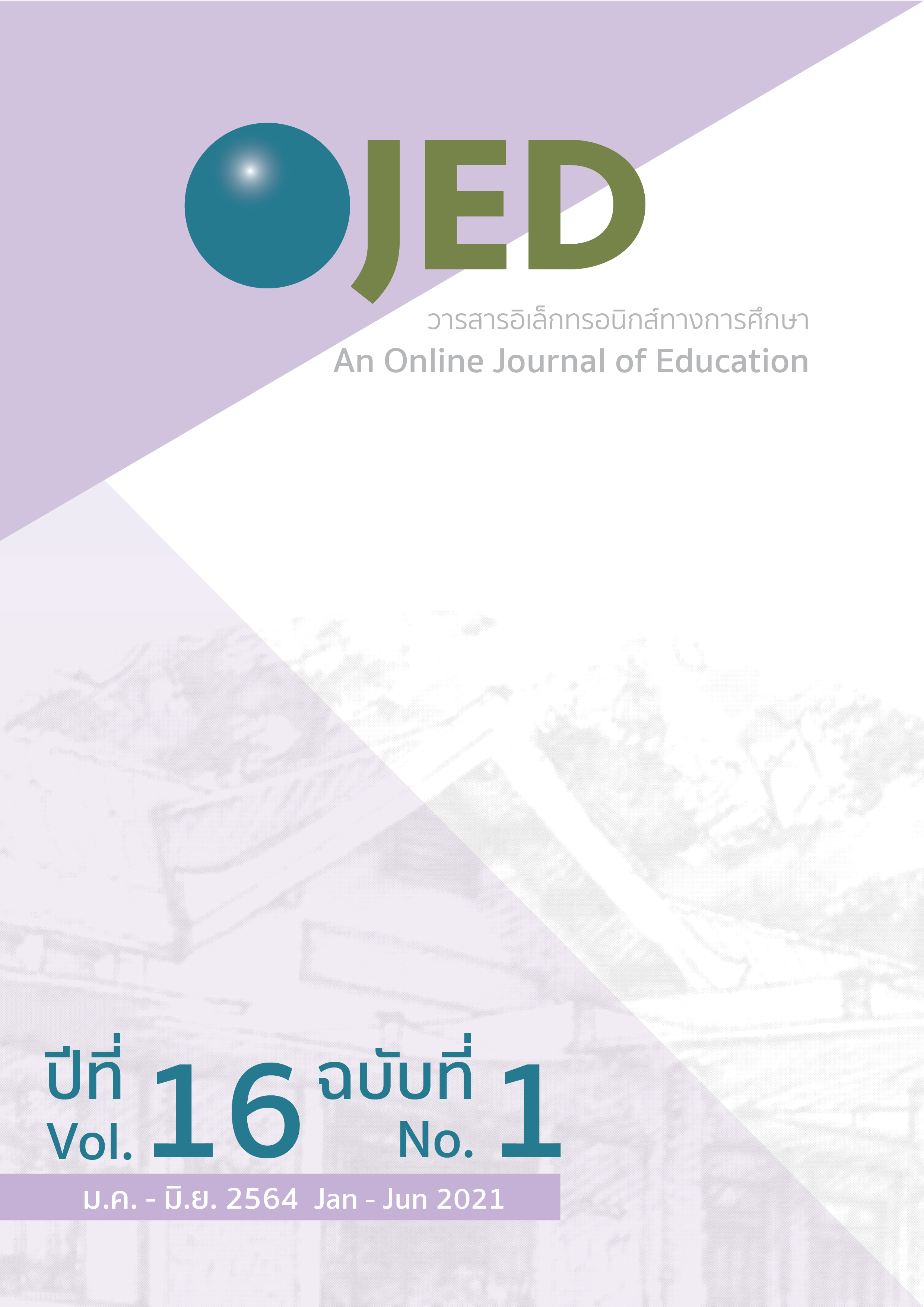The Mindset Cultivation of Knowledge with Virtue for Bachelor’s Degree Students by Using the Philosophy of Sufficiency Economy
DOI:
https://doi.org/10.14456/ojed.2021.13Keywords:
knowledge with virtue, philosophy of sufficiency economy, path analysis, mindsetAbstract
Three main objectives of this research were (1) to study the level of the use of Philosophy of Sufficiency Economy (PSE) for living, (2) to analyze the variables effecting on the use of PSE for living, and (3) to propose the guidelines of the mindset cultivation of “Knowledge with Virtue” by using PSE. For quantitative analysis (QUAN), the sample consisted of the 390 bachelor’s degree students. For qualitative analysis (qual), the sample consisted of six key informants. Three types of research instruments were included: a questionnaire, an in-depth interview form, and a field note. The research findings were as follows: (1) PSE was used by the students at high level by applying the principles of Moderation, Reasonableness, and Self-Immunity to their study and living, (2) intention directly effects on the use of PSE for living, behavioral perception directly effects on the intention and on attitude towards the use of PSE for living, the behavioral perception indirectly effects on the use of PSE for living, and (3) the guidelines of mindset cultivation of knowledge with virtue were five steps comprising Step 1: Incubation, Step 2: Perception, Step 3: Exercise, Step 4: Lesson Learned, and Step 5: Construction of Knowledge and Thinking Bodies by carrying out through the teaching and learning process in which the Philosophy of Sufficiency Economy is applied.
References
ภาษาไทย
กระทรวงศึกษาธิการ. (2552). ประกาศกระทรวงศึกษาธิการ เรื่อง กรอบมาตรฐานคุณวุฒิระดับอุดมศึกษาแห่งชาติ พ.ศ. 2552 (2 กรกฎาคม พ.ศ. 2552). กระทรวงศึกษาธิการ.
กระทรวงศึกษาธิการ. (2555). แนวทางการนำปรัชญาของเศรษฐกิจพอเพียงสู่การเรียนการสอน. กระทรวงศึกษาธิการ.
กระทรวงศึกษาธิการ. (2561). ประกาศกระทรวงศึกษาธิการ เรื่อง มาตรฐานการอุดมศึกษา พ.ศ. 2561. กระทรวงศึกษาธิการ.
จุฬาลงกรณ์มหาวิทยาลัย. (2564, 28 พฤษภาคม). คติพจน์. https://th.wikipedia.org/wiki/จุฬาลงกรณ์มหาวิทยาลัย
ชูชัย พิทักษ์เมืองแมน. (2553). ทัศนะของนักศึกษาต่อการนำแนวคิดปรัชญาเศรษฐกิจพอเพียงไปใช้ใน
การดำเนินชีวิต : กรณีศึกษาคณะบริหารธุรกิจ มหาวิทยาลัยเทคโนโลยีราชมงคลพระนคร. มหาวิทยาลัยเทคโนโลยีราชมงคลพระนคร.
ทักษิณา เครือหงส์, ธัญจิรา บุญพิชญาภา, และ รุจิรา คงนุ้ย. (2558). การนำปรัชญาของเศรษฐกิจพอเพียงไปใช้ในการดำเนินชีวิตประจำวันสำหรับนักศึกษา มหาวิทยาลัยเทคโนโลยีราชมงคลสุวรรณภูมิ. วารสารศึกษาศาสตร์ มหาวิทยาลัยมหาสารคาม, 9(ฉบับพิเศษ), 616-632.
ทิวเมฆ นาวาบุญนิยม. (2558). การประยุกต์ใช้ปรัชญาของเศรษฐกิจพอเพียงเพื่อพัฒนาคุณภาพชีวิตของชุมชนปฐมอโศก จังหวัดนครปฐม. วารสารวิทยาการจัดการ มหาวิทยาลัยราชภัฏนครปฐม, 2(1), 27-44.
นงลักษณ์ วิรัชชัย. (2542). โมเดลลิสเรล : สถิติวิเคราะห์สำหรับการวิจัย. จุฬาลงกรณ์มหาวิทยาลัย.
บุษกร คำโฮม และ ศุภกัญญา จันทรุกขา. (2558). แบบจำลองการประยุกต์ใช้ปรัชญาเศรษฐกิจพอเพียงของนักศึกษาคณะบริหารศาสตร์ มหาวิทยาลัยอุบลราชธานี. วารสารปัญญาภิวัฒน์, 7(ฉบับพิเศษ), 86-98.
ประทีป พืชทองหลาง และ ญาตาวีมินทร์ พืชทองหลาง. (2559). รูปแบบการจัดการเรียนรู้เพื่อพัฒนาพฤติกรรมการบริโภคด้วยสติปัญญาตามหลักปรัชญาของเศรษฐกิจพอเพียงสำหรับวัยรุ่น. วารสารสันติศึกษาปริทรรศน์ มจร., 4(2), 17-37.
ปรียานุช ธรรมปิยา. (2555). การขับเคลื่อนเศรษฐกิจพอเพียงด้านการศึกษา (พิมพ์ครั้งที่ 2). สำนักงานทรัพย์สินส่วนพระมหากษัตริย์.
มติชนออนไลน์. (2559, 21 เมษายน). โผล่อีก-สงสัย “ลอก” อธิการศิลปากรสั่งตรวจสอบ “วิทยานิพนธ์ ป.เอก” เจ้าตัวแจง-ลืมอ้างอิง. http://www.matichon.co.th/news/113064
มหาวิทยาลัยราชภัฏสุราษฎร์ธานี. (2564, 28 พฤษภาคม). ปรัชญา/วิสัยทัศน์/พันธกิจ. https://sru.ac.th/philosophy-vision-missions/
มหาวิทยาลัยราชภัฏเพชรบุรี. (2564, 28 พฤษภาคม). ปรัชญา/ปณิธาน/วิสัยทัศน์/พันธกิจ. https://www.pbru.ac.th/pbru/resolution
วิสาขา ภู่จินดา และ วิวัฒน์ แก้วดวงเล็ก. (2558). การวิเคราะห์ปัจจัยที่มีผลต่อการมีส่วนร่วมของชุมชนเมืองและชุมชนชนบทในการจัดการสิ่งแวดล้อม โดยยึดหลักปรัชญาของเศรษฐกิจพอเพียง. วารสารสาธารณสุขมหาวิทยาลัยบูรพา, 10(1), 39-48.
สุดาพร วงค์จำนงค์ และ นีออน พิณประดิษฐ์. (2554). ความเข้าใจและการเข้าถึงปรัชญาเศรษฐกิจพอเพียงของแม่บ้านในเขตเทศบาล อำเภอเมือง จังหวัดอุดรธานี : การศึกษาและการจัดกิจกรรมผสมผสาน. วารสารวิจัย มข., 1(2), 67-85.
สุรเจต ไชยพันธ์พงษ์. (2560). ปรัชญาของเศรษฐกิจพอเพียงกับการบริหารมหาวิทยาลัยในยุคไทยแลนด์ 4.0. วารสารร่มพฤกษ์ มหาวิทยาลัยเกริก, 35(1), 33-54.
สำนักข่าวอิศรา. (2559, 30 พฤศจิกายน). “ซื้อ-ขาย” ป.บัณฑิต วิชาชีพครู ยุคเสื่อมของระบบการศึกษาไทย. http://isranews.org/thaireform/thaireform-documentary/item/10759-2011-04-19-07-53-03.html
สำนักงานเลขาธิการสภาการศึกษา. (2560). รายงานสรุปโครงการประชุมแถลง เรื่อง แผนการศึกษาแห่งชาติ พ.ศ. 2560-2579 [เอกสารอัดสำเนา]. สกศ.
สำนักงานคณะกรรมการพัฒนาการเศรษฐกิจและสังคมแห่งชาติ. (2550). ปรัชญาของเศรษฐกิจพอเพียง. 21 เซ็นจูรี่.
สำนักงานคณะกรรมการพัฒนาการเศรษฐกิจและสังคมแห่งชาติ. (2562). ยุทธศาสตร์ชาติ ระยะ 20 ปี พ.ศ. 2561-2580 (พิมพ์ครั้งที่ 2). สำนักงานเลขานุการของคณะกรรมการยุทธศาสตร์ชาติ สำนักงานคณะกรรมการพัฒนาการเศรษฐกิจและสังคมแห่งชาติ.
Sanook. (2559, 23 ธันวาคม). “กราบรถกู” ผลผลิตของสังคมนิยมความรุนแรง!?. http://news.sanook.com/2097866.
Thaipublica กล้าพูดความจริง. (2559, 30 พฤศจิกายน). ครั้งแรกในประวัติศาสตร์ สภาจุฬาฯ ถอนปริญญาเอก “ศุภชัย หล่อโลหการ” ไม่มีผลย้อนหลัง “บวรศักดิ์” แจงในอดีตอาจจะใช้โดยสุจริต. http://thaipublica.org/2012/06/plagiarism-5.
ภาษาอังกฤษ
Ajzen, I. (1991). The theory of planned behavior. Organizational Behavior and Human Decision Process, 50, 179–211.
Choochom, O. (2015). A causal relationship of living behavior based on sufficiency economy philosophy for Thai university students. Procedia-Social and Behavioral Sciences, 177, 260-264.
Creswell, J. W., & Plano Clark, V. L. (2007). Designing and conducting mixed methods research. Sage.
Fishbein, M., & Ajzen, I. (1975). Belief, attitude, intention and behavior: An introduction to theory and research. Addison–Wesley.
Fishbein, M., & Ajzen, I. (1980). Predicting and understanding consumer behavior: Attitude–behavior correspondence. In I. Ajzen & M. Fishbein (Eds.), Understanding attitudes and predicting social behavior (pp. 148-172). Prentice Hall.
Hair, J. F., Black, W. C., Babin, B. J., & Anderson, R. E. (2018). Multivariate data analysis (8th ed.). Cengage Learning EMEA.
Rokeach, M. (1968). A theory of organization and change within value-attitude systems. Journal of Social Issues, 24(1), 13-33.
Schumacker, R. E., & Lomax, R. G. (2016). A beginner’s guide to structural equation modeling (4th ed.). Taylor & Francis.
Sideridis, G. D., & Kaissidis-Rodafinos, A. (2001). Goal importance within planned behavior theory as ‘the’ predictor of study behaviour in college. British Journal of Educational Psychology, 71, 595-618.
Triandis, H. C. (1971). Attitude and attitude change. John Wiley & Sons.
Wanasilp, W., & Tangvitoontham, N. (2015). The relationship between the understanding of philosophy of sufficiency economy and the living standard: the case study of sufficiency economy community in lower northern region of Thailand. International Journal of Business and Economic Development, 3(1), 87-95.
Wicker, A. W. (1971). An examination of the “other variables” explanation of attitude – Behavior inconsistency. Journal of Personality and Social Psychology, 19, 18–30.
Downloads
Published
How to Cite
Issue
Section
License
Copyright (c) 2021 An Online Journal of Education

This work is licensed under a Creative Commons Attribution-NonCommercial-NoDerivatives 4.0 International License.




